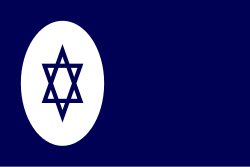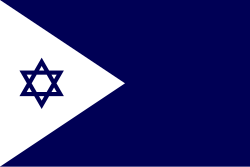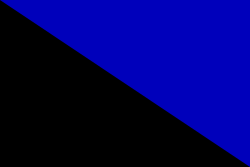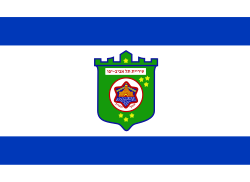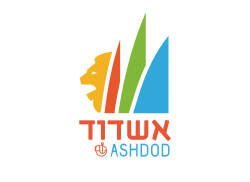| Flag | Date | Use | Description |
|---|
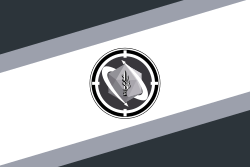 | 2022–present | Israeli Army (Zro'a ha-Yabasha) flag | 5 diagonal stripes, black/gray/white/gray/black, of proportions 2/1/5/1/2. In the center of the white stripe is a black-outlined white-bordered black disk, containing multi-faces crystal inside of target. Superimposed over them is an upright black-outlined white bayonet blade, partially enclosed on its right by an olive branch, also in black-outlined white. |
 | ?–2021 | Old Israeli Army (Zro'a ha-Yabasha) flag | 5 diagonal stripes, orange-red/white/green/black/orange-red, of proportions 2/1/5/1/2. In the center of the red stripe is a white-bordered gold disk, containing 4 semicircles of green, orange, black and orange-red. Superimposed over them is an upright black-outlined white bayonet blade, partially enclosed on its right by an olive branch, also in black-outlined white. |
 | | IDF Central Command flag | |
 | | IDF Northern Command flag | |
 | | IDF Southern Command flag | |
 | | IDF Home Front Command flag | |
 | | IDF Operations Directorate flag | |
 | | IDF Military Intelligence Directorate flag | |
 | | IDF Planning Directorate flag | |
 | | IDF Computer Service Directorate flag | |
 | | IDF Technological and Logistics Directorate flag | |
 | | IDF Manpower Directorate flag | |
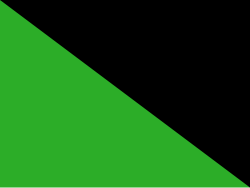 | | Israeli Armored Corps (Kheyl HaShiryon) flag | Diagonally divided black and green. |
 | | Israeli Intelligence Corps ('Aman') flag | Diagonally divided white and green. |
 | | Military Police Corps (Kheyl HaMishtara HaTzva'it) flag | Diagonally divided blue and red. |
 | | Logistics Corps flag | Diagonally divided blue and yellow. |
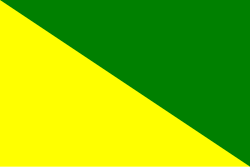 | | Israeli Infantry Corps ('Khir') flag | Diagonally divided green and yellow. |
 | | Military Rabbinate (Kheyl HaRabanut HaTzva'it) flag | Diagonally divided grey and yellow. |
 | | Technology and Maintenance Corps (Kheyl HaTekhnologya VeHaAkhzaka) flag | Diagonally divided red and yellow. |
 | | Medical Corps (Kheyl HaRfu'a) flag | Diagonally divided red and white. |
 | | Education and Youth Corps (Kheyl HaKhinukh VeHaNo'ar) flag | Diagonally divided green and blue. |
 | | Adjutant Corps flag | Diagonally divided white and blue. |
 | | C4I Corps (Kheyl HaTikshuv) flag | |
 | | Israeli Artillery Corps (Kheyl HaTotkhanim) flag | Diagonally divided red and black. |
 | | Israeli Combat Engineering Corps (Kheyl HaHandasa HaKravit) flag | Diagonally divided orange and black. |
 | 1992–? | Home Front Command (Pikud Ha-ʿOref) flag | Diagonally divided blue and orange. The colours of the homefront command are the same to those appearing in its emblem. Replaced and no longer in use. |
 | ?–present | Israeli Combat Intelligence Collection Corps flag | Diagonally divided white and yellow. |
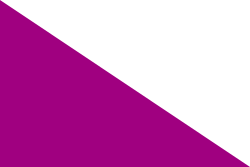 | Givati Brigade flag | Diagonally divided white and purple. |
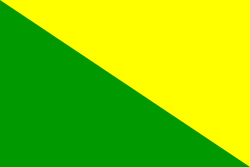 | Golani Brigade flag | Diagonally divided yellow and green. |
 | Nahal Brigade flag | Diagonally divided white and green. |
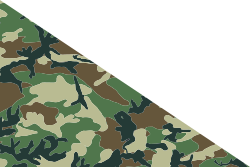 | Kfir Brigade flag | Diagonally divided white and green. |
 | Paratroopers Brigade flag | Diagonally divided white and red. |
 | ?–1992 | Flag of the Israeli Civil Defense Corps until 1992 | Diagonally divided green and red. |
 | ?–2001 | Flag of the Israeli Women's Corps until 2001 | Diagonally divided brown and orange. |

